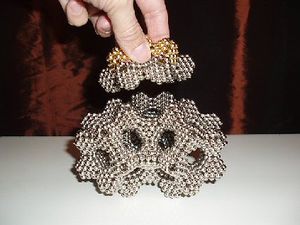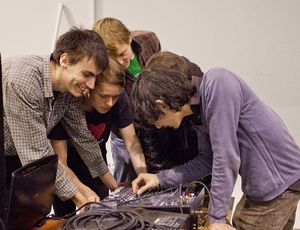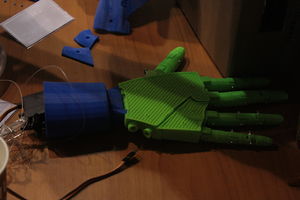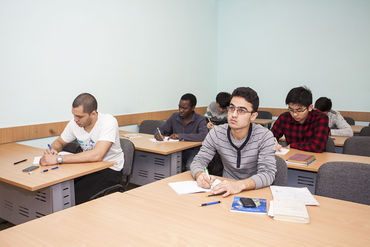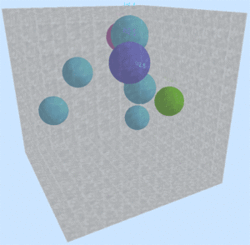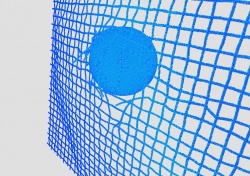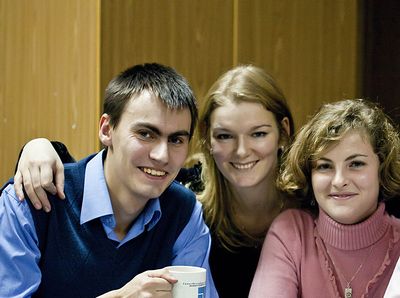Difference between revisions of "International Master Degree Program"
(→Programme structure) |
(→Programme structure) |
||
| Line 45: | Line 45: | ||
• [[Computational mechanics | Computational mechanics]] | • [[Computational mechanics | Computational mechanics]] | ||
| − | • | + | • [[Statistical Physics and Thermodynamics|Statistical Physics and Thermodynamics]] |
| − | • | + | • [[Calculus of Variations and Integral Equations|Calculus of Variations and Integral Equations]] |
| − | • | + | • [[Advanced problems in mechanics|Advanced problems in mechanics]] |
| − | • | + | • [[Computer technology in mechanics|Computer technology in mechanics]] |
| − | • | + | • [[Tensor analysis |Tensor analysis ]] |
| − | • Foreign language | + | • [[Foreign language | Foreign language]] |
| Line 62: | Line 62: | ||
'''''2 semester (30 credits)''''' | '''''2 semester (30 credits)''''' | ||
| − | • | + | • [[Nanomechanics |Nanomechanics ]] |
| − | • History and methodology of | + | • [[History and methodology of mechanics|History and methodology of mechanics]] |
| − | • | + | • [[Wave processes in elastic media |Wave processes in elastic media ]] |
| − | • | + | • [[Computer technology in mechanics|Computer technology in mechanics]] |
| − | • Biomechanics | + | • [[Biomechanics |Biomechanics ]] |
| − | • Dynamics of discrete | + | • [[Dynamics of discrete-continuum systems|Dynamics of discrete-continuum systems]] |
| − | • Mechanics of | + | • [[Mechanics of thin-wall constructions|Mechanics of thin-wall constructions]] |
| − | • | + | • [[Non-linear dynamic processes|Non-linear dynamic processes]] |
| − | • Foreign language | + | • [[Foreign language | Foreign language]] |
[[File:5.gif|250px|left]] | [[File:5.gif|250px|left]] | ||
| Line 84: | Line 84: | ||
'''''3 semester (30 credits)''''' | '''''3 semester (30 credits)''''' | ||
| − | • Dynamics of | + | • [[Dynamics of granular media|Dynamics of granular media]] |
| − | • | + | • [[Micromechanics of materials and structures |Micromechanics of materials and structures ]] |
| + | |||
| + | • [[Dynamics of discrete-continuum systems|Dynamics of discrete-continuum systems]] | ||
• Personal research project | • Personal research project | ||
| Line 93: | Line 95: | ||
'''''4 semester (30 credits)''''' | '''''4 semester (30 credits)''''' | ||
| − | • | + | • [[ScientificandResearchWork. Master’s thesis completion|ScientificandResearchWork. Master’s thesis completion]] |
| − | • | + | • [[The final certifying examination|The final certifying examination]] |
Revision as of 12:34, 4 June 2014
Contents
MSc Advanced Dynamics of Discrete and Continuum Systems
Producing Institute: Institute of Applied Mathematics and Mechanics
Program supervisor: Prof. Anton M. Krivtsov, Doctor of Physical and Mathematical Sciences, Head of the Department "Theoretical Mechanics"
Objective of the programme
The programme is conducted with the participation of key professors of SPBSPU`s Institute of Mathe-matics and Mechanics and leading European technical universities. The underlying concept of MSc program “Advanced Dynamics of Discrete and continuum System” is a balanced combination of the funda-mental and practical backgrounds, using methods of mechanics for the description of dynamic processes in different areas such as mechanics, physics, biology, sociology, economy and etc. All lectures and examinations are conducted in English.
To prepare the highly skilled scientists and engineers with a deep theoretical background and practical experience in theoretical mechanics, computational mechanics, IT, mathematical modelling and simulations, and distributed computing. Also this MSc program improves a leadership, analytical, cross-cultural and organizational qualities. Upon graduation participants will have acquired the knowledge and skills needed for a future successful career in top positions in international engineering and research companies
Key advantages
1. The graduated students have a chance to get an interesting and a well-paid job at the research in-stitutes, centres and labs. Also they can work at R&D and engineering departments of oil and gas, automotive, power and engineering, aerospace and other companies.
2. Balanced combination of the theoretical courses in mechanics and mathematics with the practical exercises, workshops and training sessions in IT, simulations and distributed computing.
3. Unique opportunities for international mobility. Possible semester abroad at academic partners of SPbSPU. Double degree options with European universities.
4. The programme offers a unique opportunity for joint study of Russian students with students from other countries, the opportunity to participate together in academic and extracurricular activities of SPbSPU.
5. Support of students individual research project and technical ideas
Programme structure
Duration and format
Training period of 2 years. part-time, contract basis. Double degree program with the Leibniz Universitat Hanover. Are possible short-term (2 months) in travel for students and TUHH LUH, long-term (6 months. - 1 year) - in the LUT
Program content
Compulsory courses, elective courses, MSc thesis. Compulsory lecture courses and a Mas-ter's theses are included into the syllabus of a student. The students have to choose one of the elective courses presented in groups А, В, C, D, E or F from the list below to get 120 ECTS to complete the program.
1 semester (30 credits)
• Statistical Physics and Thermodynamics
• Calculus of Variations and Integral Equations
• Advanced problems in mechanics
• Computer technology in mechanics
2 semester (30 credits)
• History and methodology of mechanics
• Wave processes in elastic media
• Computer technology in mechanics
• Dynamics of discrete-continuum systems
• Mechanics of thin-wall constructions
• Non-linear dynamic processes
3 semester (30 credits)
• Micromechanics of materials and structures
• Dynamics of discrete-continuum systems
• Personal research project
4 semester (30 credits)
• ScientificandResearchWork. Master’s thesis completion
• The final certifying examination
Scientific and Research work
The scientific work includes two research directions: "Mechanics of Discrete Media" and "Mechanics of Continuum Media".
The research of the direction "Mechanics of Discrete Media" proceed in a common laboratory of the Department "Theoretical Mechanics" and Institute of Problems of Mechanical Engineering Russian Academy of Science. Scientists of the laboratory "Discrete Models of Mechanics" work with different fundamental modern problems of mechanics: formulation of fundamental laws of mechanics discrete media, development of laws interparticle interactions, defining properties of discrete media at different scale levels, establishing the relationship between parameters and properties of discrete media. Analytical and computer methods admit to describe thermomechanical properties of crystallines, amorphous and nanostructured materials and shock wave processes in solids; dynamics of granular media; destruction and structural phase transitions, chemical processes; astrophysical processes; sociological processes; biological evolutionary processes, etc.
The second direction "Mechanics of Continuum Media" connected with a construction new models of continuum media for a description various physical processes and phenomenons. Analytical and computer models by the department staff, used to describe a thermal conductivity, internal friction, electromagnetic phenomena, interaction of electromagnetic fields with matter, phase transformations, chemical reactions, destruction, deformation of thin-walled structures and nano-objects. In particular, there are some research, which describe new models of particles having a complex structure and internal degrees of freedom; describe thermomechanical processes based on models of thermal conductivity and thermoelasticity hyperbolic; develop fundamentals and methods of experimental mechanics of thins, model building solid-state transitions and transitions from liquid to gas; describe of the influence of the form of the stress- strain state and material parameters on the kinetics of formation of a new phase, the develop of interfaces and fronts of chemical reactions in deformable materials.
Also the Department conduct applied investigations in lead russian research organizations: an ensuring the reliability of nuclear power plants; inertial navigation and a sports biomechanics, modeling of oil and gas production, modeling of coke formation in the path of liquid rocket engines, thermal, electrical and strength analysis of aluminum electrolytic cells, development of methodologies for calculating thin-walled structures, dynamics of rapidly systems, high-speed shooting of phenomena and processes, etc.
Teaching methods
World famous professors are invited to give the sort and long-time courses. Individual training plan based on scientific interests of the student – a choice of a case study, working in cross-cultural teams, experts workshops, visits on enterprises and internships at scientific centers in St. Petersburg. Special recourses of the SPbSPU supercomputing center a digital fabrication laboratory FabLabSPbSPU will be open for stu-dents. Every student enrolled in MSc Advanced Dynamics of Discrete and continuum System is offered to study semester abroad on European universities.
Program Staff
Prof. Anton M. Krivtsov, Doctor of Physical and Mathematical Sciences, Head of the Department "Theoretical Mechanics"
Prof. Dmitry A. Indeitsev, Director of the Institute for Problems of Mechanical Engineering Russian Academy of Science
Dr. Wenzhe Shan,
Laboratories and equipment
1. Laboratory of the Department "Theoretical Mechanics": supercomputers, 3D-model of the crystal structures, models of machines and mechanisms
2. FabLabPolytech: milling machines for metal cutting machine for wood, 3D-printers, laser cutter and engraver, cutting plotter, laser machine, bending machine, bandsaw
3. Studio "Photomechanics": equipment for high-speed video and photomicrography, photographic equipment,
Key facts
Admission requirements: candidates are required to hold a Bachelor, Specialist or Master degree in related subject area, all applicants must demonstrate English language proficiency at B+ level.
Admission tests: examination in the field of mechanics and interview in English language with programme coordinator (option - via Skype).
Admission procedure: written on-line application. Application deadline – July, 15.
Semester and date begin: winter semester – 1st of September
Length of programme: 2 years
Degrees awarded: master of science (MSc)
Tuition fees: tuition fees for Russian students - 175 000 RUR for 1 year.
Contact details
St. Petersburg State Polytechnical University
Dr. Igor Berinskii, Programme Coordinator
Polytechnicheskaya, 29, University building, 195251 St. Petersburg
Telephone: +7(812)2909872
E-mail: iberinsk@gmail.com
